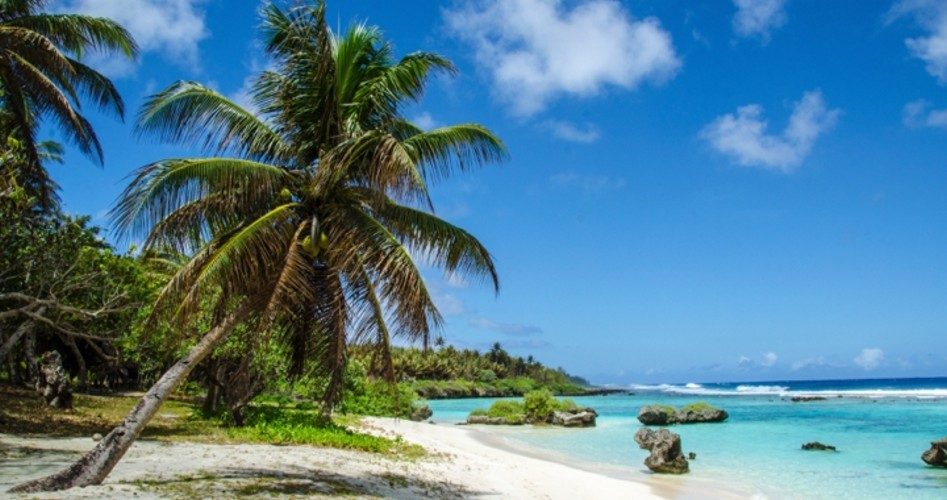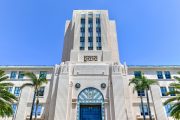
Women from China, Turkey, South Korea, and other countries around the globe have for some time been coming to America to have their babies to take advantage of what they’ve been told is a provision in the U.S. Constitution that grants their offspring automatic American citizenship. More recently, however, Chinese women have discovered a U.S. territory much closer to home that they can visit without a visa for up to 45 days, more than enough time to have their babies. The territory is Saipan, an island in the Northern Marianas, which is just a four to five hours’ flight from Shanghai and Guangzhou.
This maternity tourism “opportunity” was created when U.S. Customs and Border Protection announced the establishment of the Guam-CNMI (Commonwealth of the Northern Mariana Islands) Visa Waiver Program in January of 2009. Under the program, there are 36 countries for which the visa requirement was waived, plus six other countries that are part of a special visa waiver program. Citizens of Mainland China and Russia are eligible to visit the Northern Mariana Islands under a parole arrangement for up to 45 days.
A December 21 report in the Wall Street Journal noted that the Northern Marianas asked for the visa waiver to benefit its economy, which is heavily dependent on tourism. Tourism accounts for 72 percent of Saipan’s economy.
Many tourists come to visit Saipan’s gambling casinos. The number of Chinese visitors has risen substantially since the new policy was implemented in 2009 and now they now account for 36 percent of tourists to the island.
The Journal reported that the number of babies born in Saipan to Chinese women who entered as tourists has also climbed, from only eight in 2009 to 472 last year, citing figures from the Northern Marianas government. The year 2016 was the first time that more Chinese tourists than Americans gave birth in Saipan.
“As long as you have birthright citizenship, it’s true this is something that can be exploited,” the article stated, quoting Doris Meissner, former commissioner of the U.S. Immigration and Naturalization Service and senior fellow at the Migration Policy Institute. “This is the first I’ve heard of Saipan,” said Meissner. “That’s actually quite clever.”
The report also noted that doctors and administrators on Saipan have said the large increase in the number of Chinese mothers coming there to have babies is overwhelming health facilities. The Journal quoted Esther Muna, CEO of Commonwealth Healthcare Corporation, a government health provider which runs the local hospital, as saying. “It’s a straiin on the community.” Ms. Muna said Chinese women in late stages of pregnancy presented difficulties when doctors didn’t know their medical history and noted that in October, a Chinese mother died in childbirth on the island.
Though the practice that some observers call “maternity tourism” is encouraged by Saipan’s proximity to China and the special visa waiver program in effect for the territory, the actual numbers are quite small compared to the overall figures for the entire United States. While U.S. authorities don’t have data on how many people come to the United States each year to obtain birthright citizenship, the Journal cited an association of Chinese birth-tour operators estimate that 10,000 Chinese birth tourists came to the United States in 2012.
The New American has published several articles about birthright citizenship during the last few years that touched on several aspects of this practice, among them its burdensome economic consequences. In one such article, we observed that since California has received a far larger number of illegal aliens than any other state (an estimated three million, or about 25 percent of the national total), it naturally has shouldered a disproportionate share of the economic burden associated with so-called anchor babies.
One component of the economic burden comes from increased Medicaid costs. An example of this was provided in the article “Illegal Aliens and American Medicine,” published in the spring 2005 Journal of American Physicians and Surgeons. The author of that article, Madeleine Pelner Cosman, Ph.D., Esq., noted:
American hospitals welcome “anchor babies.” Illegal alien women come to the hospital in labor and drop their little anchors, each of whom pulls its illegal alien mother, father, and siblings into permanent residency simply by being born within our borders. Anchor babies are citizens, and instantly qualify for public welfare aid.
Cosman continued:
In 2003 in Stockton, California, 70 percent of the 2,300 babies born in San Joaquin General Hospital’s maternity ward were anchor babies, and 45 percent of Stockton children under age six are Latino (up from 30 percent in 1993). In 1994, 74,987 anchor babies in California hospital maternity units cost $215 million and constituted 36 percent of all Medi-Cal [Medicaid] births. Now they account for substantially more than half.
There is an underlying factor that is even more fundamental than sheer economics, however, and that is the practice of granting citizenship to anchor babies is made possible only by a flawed interpretation of the Constitution.
Our government’s policy granting automatic citizenship to all U.S.-born children of illegal immigrants not only encourages more illegal immigration, but it is based upon what many constitutional scholars maintain is an inaccurate interpretation of the 14th Amendment. Section 1 of that amendment, upon which claims defending birthright citizenship are based, states in part: “All persons born or naturalized in the United States, and subject to the jurisdiction thereof, are citizens of the United States and of the State wherein they reside.”
In an article in the New York Times for August 24 explaining the original intent of the members of the Congress who drafted the 14th Amendment, John Eastman, the former dean at Chapman University’s Fowler School of Law, focused on often-overlooked words of the amendment, “subject to the jurisdiction thereof.” Eastman noted that the drafters of the clause modeled it on the 1866 Civil Rights Act, which grants citizenship to “all persons born in the United States and not subject to any foreign power.”
Chapman noted that Senator Jacob Howard, who introduced the language of the clause on the floor of the Senate, contended that it should be interpreted in the same way as the requirement of the 1866 Civil Rights Act, which afforded citizenship to “all persons born in the United States and not subject to any foreign power.”
Since illegal aliens are subject to the jurisdiction of the country from which they emigrated, their children — whether born in the United States or elsewhere — would also be subject to that jurisdiction, just as the children of U.S. military members born overseas are still U.S. citizens subject to the authority of the United States.
As we have observed in the past, the economic consequences of using this misinterpretation of the 14th Amendment to grant birthright citizenship to “anchor babies” is just part of the problem. An even greater principle is at stake: our national sovereignty, which presumes maintaining control over who is, and who is not, a U.S. citizen.
In 2015, when he was a candidate for the presidency, Donald Trump released his campaign’s immigration plan that called for an end to birthright citizenship. “This remains the biggest magnet for illegal immigration,” Trump wrote. “By a 2:1 margin, voters say it’s the wrong policy, including [Democratic Senate Minority Leader] Harry Reid, who said ‘no sane country’ would give automatic citizenship to the children of illegal immigrants.”
While it is encouraging that Reid was in agreement with Trump on this issue, we have yet to see those sentiments transformed into political reality. If Reid’s statement was true, and there is every reason to believe it was, it is high time to restore sanity to our nation’s immigration policies.
Photo: CampPhoto/iStock / Getty Images Plus
Related articles:
Jeb Bush: Asians Abuse “Noble Concept” of Birthright Citizenship
Trump Gives New Life to Bill on Birthright Citizenship
Trump Is Right on Ending Automatic Citizenship for Anchor Babies
Time Magazine Cover Story Asks: Does the Constitution Still Matter?
“Maternity Tourism” Business Booming in California
Senators Vitter and Paul Seek Closing of Anchor Baby “Loophole”
State Legislators for Legal Immigration Ask Congress to Reconsider Intent of 14th Amendment
Constitutionality of Anchor Babies Questioned
Birthright Citizenship Creates Burdensome Economic Consequences
“Maternity Tourism” Business Booming in California



